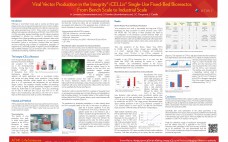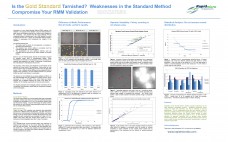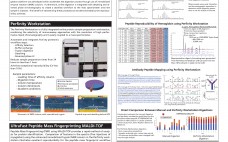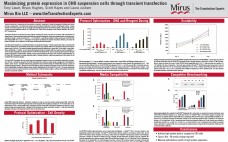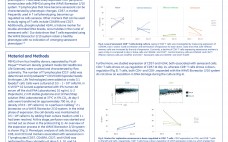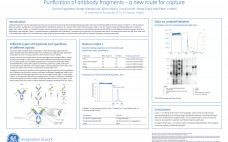Recombinant viruses (e.g. lentivirus and adeno-associated-virus) can be used as human gene therapy vectors. They are mainly produced in adherent cell cultures (e.g. HEK293T, A549, VERO) in Roller Bottles or multiple-tray-stacks using either transient transfection or infection strategies. Therefore, the Integrity® iCELLis® (ATMI LifeSciences) line of bioreactors offers a new production alternative with stronger process controls and ease of scale-up. The iCELLis bioreactor is designed for adherent cell culture applications. Cells grow on microfibers carriers packed in a fixed-bed…
2013 Collection
Is the Gold Standard Tarnished? Weaknesses in the Standard Method Compromise Your RMM Validation
Introduction of a new Rapid Microbial Method (RMM) requires a full validation. The purpose of the validation is to prove that equivalent or better results are obtained using the new method when compared to the compendia. One assumes that the result obtained with the compendial method is absolute and is the “Gold Standard” by which to compare the new test. In reality, the compendial method exhibits a number of weaknesses that compromise the integrity of the validation. The standard requires…
Cookie Cutter Proteolysis: Achieving Reproducible, Efficient Digestions for Proteomic Workflows
Cookie Cutter Proteolysis: Achieving Reproducible, Efficient Digestions for Proteomic Workflows  Protein sample preparation workflows for mass spectrometric analysis that involve proteolysis are often labor-intensive, time consuming and user dependent. These workflows often involve digestion, solid phase extraction, drying, and re-suspension prior to reversed phase separation into the mass spectrometer. The introduction of variability at many of these steps hinders discovery initiatives as well as the ability to convert these discoveries into viable assays.  Recently, an automated protein digestion…
Maximizing Protein Expression in CHO Suspension Cells Through Transient Transfection
Transient transfection in mammalian cell lines provides an avenue for researchers to bridge the development bottleneck and shorten the time to usable protein. The method also maintains post translational modifications crucial for biotherapeutic function. Chinese Hamster Ovary (CHO) suspension cells are especially suited for high yield production of recombinant proteins, despite being refractory to commonly used transfection methods (e.g. 25kDa linear PEI). Mirus Bio has developed a more effective alternative, the TransIT-PRO® Transfection Kit. Transfection efficiencies are affected by many…
T Cells Expanded in the WAVE Bioreactor™ 2/10 System Maintain a Healthy Phenotype
T cell immunotherapy often requires the expansion of a small select starting population in vitro. To achieve therapeutic doses, this population is required to undergo multiple and rapid rounds of replication. Rapid T cell expansion raises the possibility of inducing senescence or an aged phenotype, both of which are detrimental to the recipient patient. The WAVE BioreactorTM System is often used for the final expansion phase before patient infusion and we have analysed the aging characteristics of T cells that…
Transfer of Hepatic Progenitor Stem Cell Culture Process from Multitray Stacks to the Integrity® Xpansion™ Multiplate Bioreactor
Scale-up a stem cell process may be challenging: small variations in physicochemical parameters (surface characteristics, pH and dissolved oxygen) can heavily impact stem cell growth and behavior. The Integrity® Xpansion™ multiplate bioreactors have been designed to enable an easy transfer from multiple-tray stacks process by offering the same cell growth environment: stacked hydrophylized polystyrene plates in a compact and closed system (from 10 to 200 plates per bioreactor equivalent respectively to 6120cm² and 122400cm²). As there is no headspace between…
Characterization of a Biomanufacturing Fermentation Process Using a New DOE Approach: Definitive Screening Designs
Traditionally, a bioprocess is characterized using a two-step approach involving factor screening designs followed by response surface designs. This approach is very costly and time consuming since it requires a significant number of runs. Recently, Jones and Nachtscheim (2011) described a more efficient design that allows for factor screening, resolution of two-way interactions as well as estimation of quadratic effects in a single-step. The design, termed Definitive Screening has not yet been validated on a bioprocess. Here, traditional and Definitive…
AbSolute® High Cap by Novasep: Revolutionary Protein A Media
Novasep has developed AbSolute® High Cap, an optimized silica-based protein A media for the capture of monoclonal and polyclonal antibodies. This protein A media is adapted to all fermentation volumes while offering the highest dynamic and static binding capacities (DBC10% ≥ 60 mg/mL, SBC ≥ 95 mg/mL) and, as a result, high productivities at all velocities. By decreasing the amount of resin required to downstream a feed (30-50% less), AbSolute® High Cap enhances the robustness of the protein A capture…
Sartopore (R) Platinum Sterile Filtration, Redefined
We introduce a new class of Sterile Filtration for Biopharmaceutical industry with Sartopore® Platinum. It offers exceptional total throughput, thanks to its patent-pending TwinPleat technology with 1 m2 area/10” element. At the heart of Sartopore® Platinum are PES membranes permanently hydrophilized with proprietary grafting of thermally stable polymer on to membrane surfaces. This leads to minimal wetting requirements prior to Integrity testing with < 5 L./10” preflush needed in < 1 min. They also offer low Protein Binding and low…
Purification of Antibody Fragments: A New Route for Capture
Antibody fragments have the potential to become the next important class of protein-based biotherapeutics after monoclonal antibodies (MAbs). The introduction of Capto™ L, with its protein L ligand, provides a possibility for an industrial platform purification approach for capture of this class of biomolecules. Capto L can bind a broad range of antibody fragments containing kappa light chains. Capto L is the latest member of chromatographic media (resins) in the toolbox consisting of several different products with affinity for the…

